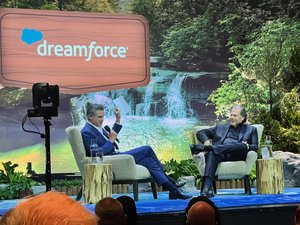
Yes, the artificial intelligence sector is still overflowing with hype, but Salesforce's venture capital arm is betting on the longevity of this technology. You could even call it a platform shift.
Salesforce Ventures now has $1 billion dedicated to its generative AI fund and managing partner Paul Drews is looking for a variety of companies building everything from small foundational models to autonomous agents and other types of applications.
I spoke with Drews during Dreamforce in San Francisco this week about his investing strategy, whether the AI hype is justified and why bigger isn't necessarily better when it comes to foundational models.
How has your investing strategy evolved over the years?
I started investing back in 2007/2008 — a really interesting time to be investing because you had a peak in '07 and the crash, and then after that a long, extended bull run. But one of the things that I've always looked for are these platform shifts in the market. When I started in 2007/2008, the big platform shift at that point was the cloud market.
Fast forward to where we are now, over the past three to four years I spent a lot of time at Salesforce Ventures investing in data and in AI. It became clear from the Salesforce Ventures perspective that AI was a huge trend. Even before the ChatGPT releases, we've been investing in AI for a decade.
What sorts of generative AI companies are you looking to invest in?
We break down the generative AI market into a few different categories. We start at the foundational layer, LLMs, and we've made investments in companies like Anthropic, Cohere, Mistral.
On the open-source side, the way we think about it is MLOps and the tooling layer. How do you make this AI work together? We've invested in companies like Hugging Face, Together AI. Then you have the applications. These could be horizontal applications or vertical applications.
One of the things that we're really focused on is what are the tools that are required for enterprises to actually put AI into production? That's things like security, governance, compliance.
Also the next wave of AI is around agents. In particular, what are the characteristics or infrastructure required to have successful agents? Things like memory for the agents, reasoning, planning.
One of the other trends we're seeing is around smaller (language models).
So, maybe really large, broad models like what OpenAI develops are good for some things but businesses also need smaller models that are very specific, too?
That's exactly how we think about it. One of the common things we hear is that it's not just one model that they're going to deploy. They're going to deploy maybe 10 or 15 or maybe many dozens of models. Some of those, I'm sure, will be the large foundational LLMs, (from) the Anthropics of the world. Many will also be open-source models, and that's why we're so excited about what Mistral is doing, and Hugging Face.
And then other models will be homegrown, proprietary or smaller models that, again, are just more efficient. They don't require all that cost for training but can be really accurate and really effective for tasks and focused objectives?
Salesforce is trying to position itself as the king of agents, but it sounds like that doesn't preclude Salesforce Ventures from investing in startups innovating around agents?
There's still plenty of space for there to be third-party agents in the world that can be very complimentary to many of the things you've heard today (at Dreamforce), as well.
Would it be fair to say we're still in an AI bubble?
I think there's a lot of hype in the market right now for AI. A lot of it is justified, though, because this is such a large secular shift that we're seeing and we know there's going to be huge value creation at the end of this. With that said, there are going to be companies that face challenges because not every company can be a large, standalone business.
Are you always on the phone with Marc Benioff and Clara Shih? How closely are you working with others at Salesforce when you're doing your thing on the venture side?
When we're making investments in companies, our goal is to be a value added partner and we think we can bring value in a number of different ways. That could be through the power of Salesforce. Working really closely with Clara, we'll work hand in hand evaluating categories and individual companies even. But it's also bringing value through the Salesforce customer network. We have an innovation advisory board that's comprised of dozens of CXOs in the industry, many of whom are Salesforce customers, and they want early access to innovation. But yeah, we work really closely with the different executives and product leaders in Salesforce as we're evaluating various categories and companies.








